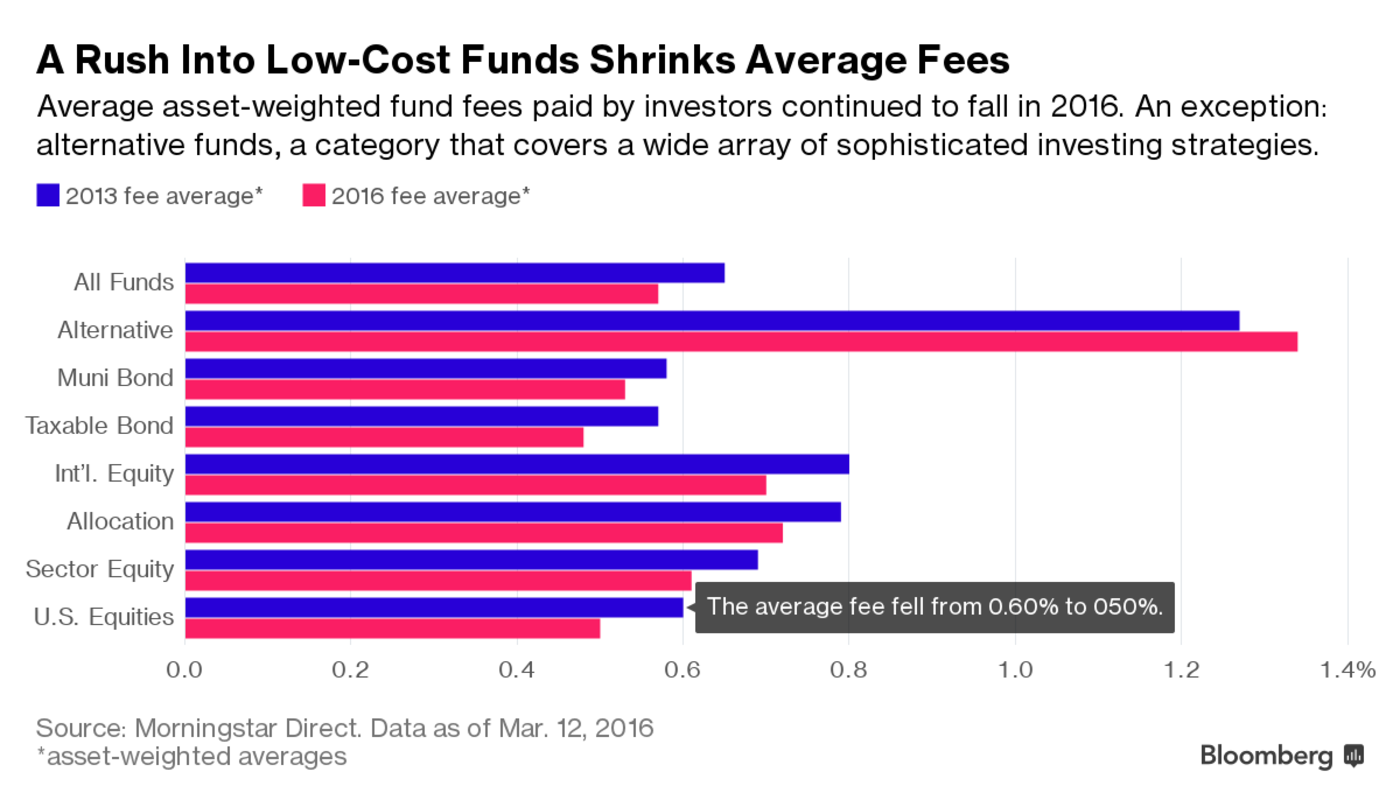(Bloomberg) --Average fees paid for U.S. mutual funds and exchange-traded funds fell to a new low of less than 0.6 percent in 2016, Morningstar reported on Tuesday.
That's good news for investors. But as fund companies drive down those expense ratios in a fight for your savings, beware the marketing that goes with the price war.
Weighting fees by the size of a fund's assets, the fund research firm found that investors paid an average expense ratio of 0.57 percent last year, down from 0.65 percent in 2013. That's a 14 percent drop, the largest annual decline Morningstar has seen in more than a quarter-century. So far, so good.
A fund's expense ratio is the percentage of invested assets it takes out annually in management fees, operating costs, and so forth. Weighting lessens the impact of high-fee funds with low assets, which otherwise tend to exaggerate the average expense ratio. When Morningstar calculated the simple average expense ratio for all funds, without weighting by fund assets, it was 1.14 percent.
The problem is that when an expense ratio is touted as "below average," it isn't always clear which average is being used. Next to 1.14 percent, a fee touted as below average could be more than 1 percent—no bargain. In fact, that 1.14 percent represented less than 10 percent of all fund assets at the end of 2016.
The lower fees in the chart below are mostly the result of investors shifting money out of higher-priced actively managed funds and into lower-cost passive index funds and institutional share classes of funds.

Workplace retirement savings plans are making more lower-cost funds available and removing higher-fee funds from their lineups—one reason for the shift. The money's primary destinations: Vanguard Group and BlackRock/iShares, the market share leaders in passive funds.
Passive funds have helped fuel the exodus out of active funds by continuing to lower fees. Their asset-weighted average expense ratio was 19 percent lower in 2016 than in 2013. For active funds, the decline was 6 percent. That led to a gap between the average expense ratio of passive and active funds that ran from 0.17 percent to 0.75 percent for 2016.
Here are some highlights of the report, based on asset-weighted fee averages.
Lowest expense ratio: Vanguard
The winners were Vanguard, at an average of 0.11 percent; SPDR State Street Global Advisors, at 0.19 percent; and Dimensional Fund Advisors, at 0.36 percent. BlackRock/iShares wasn't far behind, at 0.38 percent. Next came Fidelity Investments, at 0.58 percent.
Biggest decline in fees: U.S. equity funds
Average fees on U.S. equity funds fell 17 percent from 2013 to 2016, the largest drop across the seven asset class categories Morningstar tracked. Some 41 percent of all assets in U.S. equity funds are now in passive funds.
Only category to see fees rise: alternative fundsThese funds, which deploy a host of complicated investing strategies, were alone in seeing average fees rise, to 1.34 percent last year from 1.27 percent in 2013. One reason for the increase is performance chasing by investors, which swelled the assets of some of the higher-performing—and higher-fee—funds. That gave them more weight in the calculation of asset-weighted average fees. "Expensive active funds, such as Marketfield (whose institutional share class charges 1.56%) and Gotham Absolute Return (2.20%), enjoyed large flows following a year of strong performance," the Morningstar report said.
This means war
Thanks to the price war among the fund companies, the average expense ratio on ETFs was 0.24 percent last year. That's down from an already low 0.29 percent three years before.
The lesson for investors: Expense ratio claims are relative. It literally pays to scrutinize "below-average" fees.
To contact the author of this story: Suzanne Woolley in New York at [email protected] To contact the editor responsible for this story: Peter Jeffrey at [email protected]





